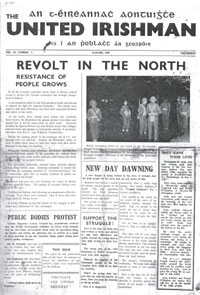18 January 2007 Edition
The Resistance Campaign 50 years on

An tÉireannach Aontaithe/The United Irishman
IRA Border Campaign
This week Mícheál MacDonncha begins a monthly series marking the 50th anniversary of the IRA’s Resistance Campaign – more widely known as the Border Campaign – which commenced in December 1956. The series will be based on the monthly republican newspaper of the time An tÉireannach Aontaithe/The United Irishman.
January 1956 opened with the Brookeborough raid, the deaths and funerals of Seán Sabhat and Fergal O’Hanlon, repression by the British and Stormont governments and the catapulting of Partition and Irish sovereignty back onto the political agenda nationally and internationally. All of this is reflected in the January 1957 issue of The United Irishman.
“Revolt in the North” was the main front page headline in a report which stated that in all Six Counties “guerrillas struck back as Britain rushed to protect her colonial possession and strategic bridgehead in Ireland”. The same page reported the deaths of Sabhat and O’Hanlon. Internment without trial had already been imposed in the North and Sinn Féin had been banned by the Unionist government. The paper reported the forced closure of the Belfast Sinn Féin office and the seizure of furniture and equipment.
Three thousand regular RUC and B-Specials were involved in a massive search for an IRA column in North Antrim. The paper reported that most evaded capture but three men were arrested at Torr Head. They were Tony Cooney, James Linehan and William Gough, all from Cork. They were charged in Ballymoney with attempted murder and refused to recognise the court. In court in Belfast was Patrick Doyle of Whiterock who was jailed for three months for possession of a Belfast republican publication called Resistance.
The British government was still suffering international humiliation after the failure of its attempt in 1956 to seize the Suez Canal from the people of Egypt. The United Irishman quoted a British newspaper saying the results of the Suez disaster were “the miseries of petrol rationing, a dollar crisis, threatened unemployment, a British government with a broken back, a Commonwealth less united than ever in its history, Russian intervention in the Middle East and an Anglo-American alliance that has nose-dived in the Atlantic”. And in a stark reminder of the North of Ireland’s place in the British Empire, the Royal Warwickshire Regiment had just been deployed in the Six Counties and were described by English newspapers as “men hardened in battle conditions in Korea, Cyprus and Suez”.
Much space is devoted to replying to the statement of Fine Gael Taoiseach John A. Costello who defended the actions of 26-County troops and Gardaí patrolling the Border and arresting 13 republicans. Costello said he was not upholding Partition but defending the institutions of the State. The paper said “the Resistance Movement in the Six Counties is not attacking the institutions of the 26 Counties and since the writ of the 26 Counties Oireachtas does not run in occupied Ireland it hardly needs vindication there”.
The paper also responds to media coverage of the campaign. Unionist Prime Minister Lord Brookeborough told BBC television viewers that “we are England’s oldest colony. We are all Britishers – either Scotsmen or Welshmen or Englishmen”. In the British media the Manchester Guardian said the Dublin government had warned the Press not to report the Sinn Féin rally in Dublin on 17 December but the ban was defied by the papers, including The Irish Times. International news agencies Reuters and the Associated Press are criticised for their “distortion”.
Tipperary County Council passed a resolution calling on the British government to withdraw its forces from Ireland, for the Dublin government to desist from operations along the Border and for the release of republican prisoners. Other local authorities were reported to have passed similar resolutions.


